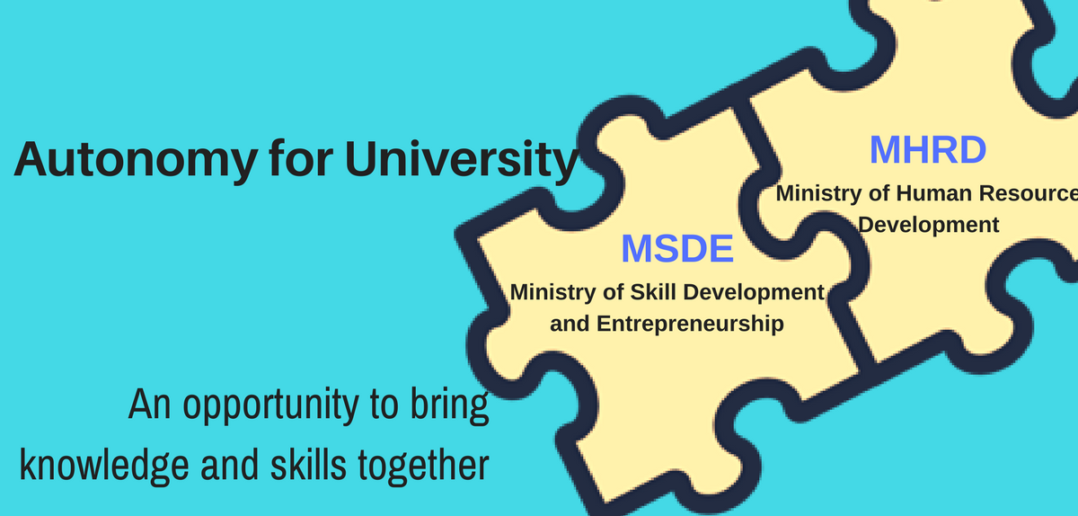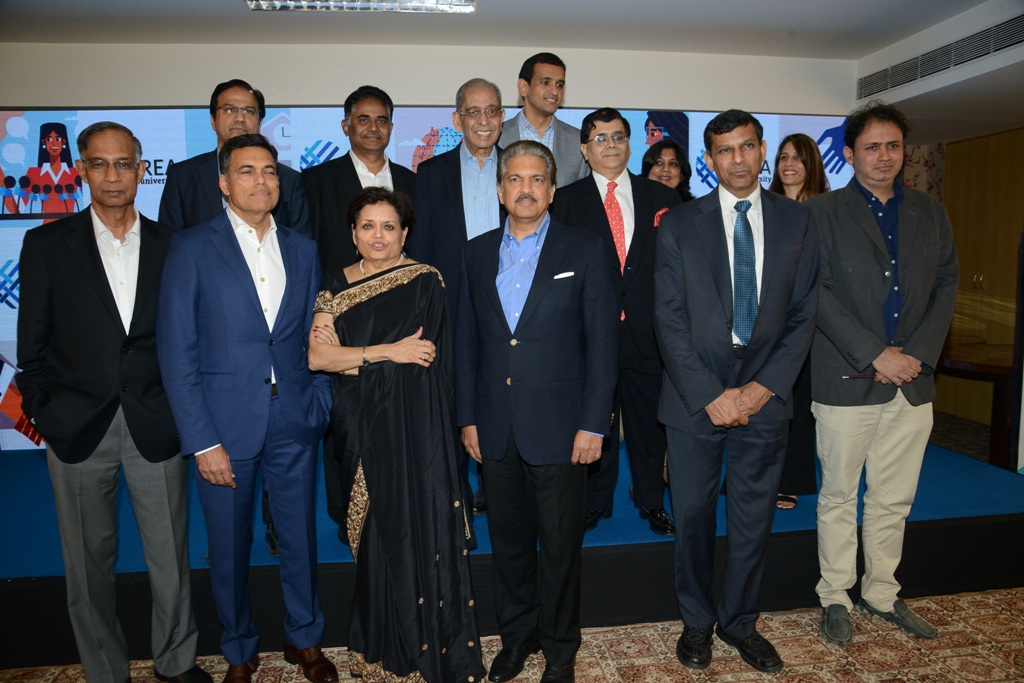The grant of autonomy* to universities on the basis on meritorious performance (based on NAAC Scores) is a great opportunity to embark on equitable higher education initiatives that address India’s diverse and complex socioeconomic needs. These needs go beyond acquiring higher degrees, and call for making a difference in improving the lives of people, creating avenues for empowering the underprivileged and many imperatives that form a part of India’s inclusive growth trajectory.
Autonomy has many positives for building world-class institutions on the basis of outcomes and practical application of knowledge by teachers, students, researchers – demonstrating our ability to marry the intellectual and the academic with things that are purposeful, pragmatic and profitable. Autonomy can inspire institutions to embark on agendas that were hitherto embroiled in bureaucratic procedures and highly regulated frameworks and a culture of subsidies.
Exploring synergies between MHRD and MSDE
In academic circles, MHRD and UGC are organizations that we often refer to in most of our conversations. Decisions taken by them have a direct impact on the university, its staff and students. Though it is not expected that everyone associated with academics should some knowledge about Ministry of Skill Development and Entrepreneurship (MSDE), with the grant of autonomy for universities, it is a wonderful opportunity to understand what, why, how this Ministry came into being and how it has to align with academia for long term impact through engagement with Sector Skill Councils for various industries, role of NSDC,National Skill Development Policy and other milestones on the roadmap from MSDE. Skill development programs and entrepreneurship promotion are not limited to trades like plumbers, masons and carpenters and other entry level jobs – it has larger goals that need active and whole-hearted participation and contribution from MHRD – it is here, autonomous universities can definitely take the lead. This is sure to being in interoperable models that build bridges between the highly aspirational academic courses and the not-so-aspirational or least-aspirational vocational and skill-based components.

Autonomy is major step towards initiating mutual synergies for quality education, applied knowledge and skills and nurturing job-creation in organized and unorganized sectors. Autonomy provides greater scope for bringing the industry closer to the university for preparing youth to reap the benefits of India’s demographic dividend.
The dynamic nature of the industry needs many interventions in the academic domain to match the curriculum with the job-roles, be in continuous touch with latest developments in technology, bring adjunct faculty and subject experts who can be a part of delivering outcome-based courses.
Being in-sync with the industry
The corporate-academia – connect is extremely crucial considering the socioeconomic goals that universities can fulfill by connecting the 5 Es – Education, Employability, Employment, Entrepreneurship and the Economy. Since education leads to many outcomes such as employment, research and innovation – ongoing collaboration with the industry by exploring and aligning curricular intervention could benefits both the stakeholders. The quest for designing purposeful, pragmatic and profitable courses that bridge the gap in the job market is better explored by interacting with the industry experts who have spent years gaining experience on things work and what is needed in terms of knowledge, skills and abilities.
“Although these universities will remain within the UGC’s ambit, they will have the freedom to launch new courses, off-campus centres, skill development courses, research parks and new academic programmes. They will also have the freedom to hire foreign faculty members, enrol foreign students, give incentive-based emoluments to faculty members, enter into academic collaborations and run open-distance learning programmes.” Mr. Prakash Javdekar, Human Resource Development Minister of India
Preparing teachers and students to appreciate autonomy
The above quote sums it all! Autonomy gives freedom to launch many initiatives. But these initiatives should be launched with proper education of the teachers, the administrative staff and other stakeholders without whose support, things may just fizzle out. For many teachers autonomy means a burden that brings extra responsibilities. They may not willingly participate in the new programs and the purpose gets lost if they are not made aware of the benefits for self-development, research-based teaching, facilitation and the value they bring to and how their efforts will be recognized – in monetary or non-monetary ways.
Recognizing and promoting grassroots level innovation
Another area where autonomy has show great results pertains to the expansion of outreach to recognize and reward grassroots level pursuits. Initiatives to recognize non-formal inventions and innovations could be jointly done by the university and the industry, in order to build and promote problem-solving culture and frugal innovation that solves social problems. Funding and encouragement of such projects not only helps the individuals, it also motivates and inspires them to do better and continue to contribute to social, developmental causes.
Preparing students for future jobs
Orientation towards practical application of knowledge gets translated into introducing courses that equip the students with skills that are needed for self-discovery and development, self-fulfillment, employment and entrepreneurship. This doesn’t just mean skills for getting jobs; it goes much beyond. The need of the hour is to create awareness among students that the world of work is undergoing rapid transformation and the knowledge they gain through academic courses needs to be supplemented with skills that are need for employment and survival in a competitive environment.
Marketing research and finding meaningful applications
The freedom to explore new ways of marketing our research is something we should focus on. Many thesis never see a life beyond the shelves of the libraries and many research papers never get a chance to translate into project that can perhaps create new products or services. University can explore new ways of marketing research done through UGC / AICTE funding particularly in Humanities and Sciences, while promoting industry-funded projects for teachers who do not have exposure to how things actually work or how academic knowledge can be applied for solving many problems.
Smart use of digital technologies to widen the outreach
Digital technologies is not just for offering e-learning courses, it also has tremendous potential to ensure quality and consistency of learning content, application of blended methods of learning, new role of teachers and many other aspects that can engage the learners with highly relevant content. It can also build communities with strategic use of social media, inviting experts from the industry and senior faculty members.
It all depends on how we embrace the rights, the liberties, the freedom along with responsibilities. This could mean building inclusive, highly credible and self-sustainable models of interdisciplinary curriculum, research and innovation or promoting a culture of entrepreneurship. This could also mean exploring collaborations with the relatively new Ministry of Skill Development and Entrepreneurship (MSDE) and the evolving vocational education and training ecosystem in India. There could be many ways of using the autonomy for larger societal impact. I welcome your ideas and suggestions.
(*Autonomy was also the area of my doctoral research and currently I am exploring ways to bring the academia and industry closer in collaboration with CII- Southern Region and our portal https://nationalskillsnetwork.in/)
(This article is reproduced from my LinkedIn Post with the same title: https://www.linkedin.com/pulse/university-autonomy-opportunity-build-bridges-between-dubey-ph-d/)













